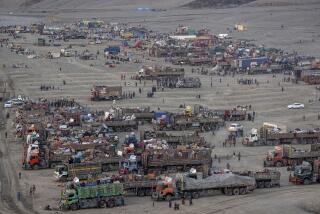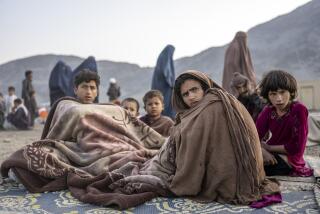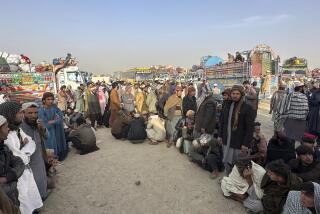Afghan War Blamed for Pakistan Ethnic Strife : Karachi Slum Dwellers Say Conflict Brought Refugees, Drugs and Guns
- Share via
KARACHI, Pakistan — Members of the embattled Mohajir community, their slum neighborhoods devastated by four days of ethnic violence in which 150 have died here in Pakistan’s largest city, feel they are indirectly victims of the war in Afghanistan being fought hundreds of miles to the north.
The Afghan war, they say, placed automatic weapons in the hands of their enemies on Karachi streets. The war also brought more than 3 million Afghan refugees into Pakistan to compete with them for jobs and living space, and it helped create the violent heroin trade that has made Karachi into a world drug nexus.
“Afghans are the root cause of the trouble here,” complained Nisar Ahmad, 50, a schoolteacher in the Orangi slums where many Mohajirs have been killed. “Before the Afghan influx into Pakistan, there were no communal riots here.”
Such anti-Afghan attitudes reflect a growing bitterness in some sections of Pakistan society over the continued presence on Pakistani soil of the refugees, who amount to the world’s largest refugee population.
Military Enforces Curfew
After three days of violence, more than 600 people have been killed or wounded in the Karachi fighting. For the third day in a row, most areas of the city except for a few affluent neighborhoods and the central business district remained under military-enforced curfew.
At least 27 more bodies were recovered Tuesday, including those of 13 who hospital officials believe died late Monday night in fires in the Orangi slums in the northern sector of the city.
Overall, however, the intensity of the violence lessened somewhat as troops managed to occupy commanding positions in the Al Fatah hills overlooking the northern slum areas in this metropolis of 7 million.
The main victims of the ethnic conflict continue to be Mohajirs, 3 million Urdu-speaking Muslims who migrated to Pakistan from India and Bangladesh in several waves after 1947. Since Saturday, the Mohajirs have been under attack from heavily-armed gangs of Pushtuns.
Pushtuns are members of Pushtu-speaking warrior tribes, most of whose native regions lie along the Afghan-Pakistani border. However, 2 million Pushtuns (also called Pathans) live in Karachi, an ethnic group second only to the Mohajirs in size and the Mohajirs’ main competitors for jobs. Karachi’s Pushtun population today includes as many 200,000 Afghan refugees.
Most Victims Mohajirs
Pushtuns have also died in the current ethnic violence, particularly Monday when the Mohajirs retaliated for killings committed by the Pushtuns over the weekend.
Pushtun leaders alleged that it was the Mohajir community that started the conflict, but the overwhelming majority of the victims have been Mohajirs.
“These (Mohajir) people are poor,” Dr. Assan Raza, 29, chief doctor at the Al Raza Hospital said. “They can’t fight. They don’t have weapons. They can be killed very easily.”
Raza’s hospital is in that part of the Orangi district where the Pushtun-Mohajir violence has been fiercest and where many Mohajirs have been killed.
When he established the clinic in 1981, Raza said, he treated mostly respiratory diseases and cholera, malnutrition and dysentery--the usual maladies of the South Asian subcontinent. In the last three years, however, there have been nine serious outbreaks of violence between Mohajirs and Pushtuns, and his attention has shifted to treatment of bullet wounds.
He said he treated 63 patients with serious bullet wounds Monday, including 17 patients who later died.
Like 200,000-plus other residents of the poorest section of the Orangi slums, Raza is a Bihari, part of the immigrant waves that came here from East Pakistan after it became Bangladesh in 1971. The Urdu-speaking Biharis allied themselves with the West Pakistan army in the Bangladesh war for independence, and many were slaughtered by Bengali nationalists when the Pakistan army was defeated by the Indian army.
Survivors to Karachi
Many of those who survived migrated to Karachi, where they formed the lowest rung of Pakistan urban society. Their main neighbors in the Karachi slums are the Pushtuns. According to Mohajirs interviewed Tuesday, the two communities coexisted peacefully until 1980, when large numbers of refuge-seeking Afghan Pushtuns began migrating to the city.
Driven from their own country by Soviet troops, the Afghan Pushtuns mixed easily into the established communities of their ethnic Pakistani cousins. Many brought trucks and other vehicles with them from Afghanistan, helping Pakistani Pushtuns dominate the transportation industry in Karachi.
Many of the local Afghans remain committed to fight against the Soviet-backed regime in Kabul, and a significant number of them possess weapons furnished by the United States and other nations backing the guerrilla fight against the occupation of Afghanistan by Soviet troops.
The United States and others sent more than $400 million in covert military aid to Afghan rebels last year, some of which was diverted into Pakistan en route. Western diplomats in this country agree that 10% of the weapons and equipment destined for Afghanistan never makes it there.
Embittered by Drugs
Many Afghan refugees, particularly those living in Karachi and working in the transportation industry, are also involved in Pakistan’s enormous heroin and hashish trafficking. Such drug dealing has also embittered other sections of Pakistan society against the Afghans.
Public pressure to clean up the Afghan drug traffic led to a massive raid by several thousand army soldiers and police here last Friday. The security forces moved into the densely populated Sohrab Goth slum where Afghan drug trafficking is centered, leveling the ramshackle community with bulldozers and relocating the population in a special camp several miles away.
The raiders seized almost 500 pounds of heroin, but the Pushtun community reacted bitterly. Community leaders called for a strike, and gangs of armed Pushtuns began roaming the streets, assaulting their Mohajir neighbors, apparently because the latter recently tried to have Afghan Pushtuns removed from the area. That effort has been encouraged by a newly formed Mohajir political organization.
Policy Losing Support
Anti-Afghan sentiments in Karachi are among several signs that public support may be diminishing for the policy of President Zia ul-Haq to accept Afghan refugees and let them live in Pakistan as “brothers in Islam.”
“Three million Afghans have been guests of Zia ul-Haq in this country, and they are all robbers,” Ahmed, the Orangi schoolteacher, said.
The tensions created from the overflow from Afghanistan have already been the source of considerable strain in other areas, fueling additional opposition to Zia’s leadership.
Terrorist bombings in the Afghanistan border areas of Baluchistan and the North-West Frontier provinces have upset Pakistanis in those areas. An explosion in a Quetta post office two days ago killed one man and injured several others.
Meanwhile, Afghan refugees compete with Pakistani natives in those areas for animal fodder and firewood. Wealthier Afghan refugees, some of whom have been enriched by the heroin traffic, have driven up real estate prices in Pakistani cities.
More to Read
Sign up for Essential California
The most important California stories and recommendations in your inbox every morning.
You may occasionally receive promotional content from the Los Angeles Times.













